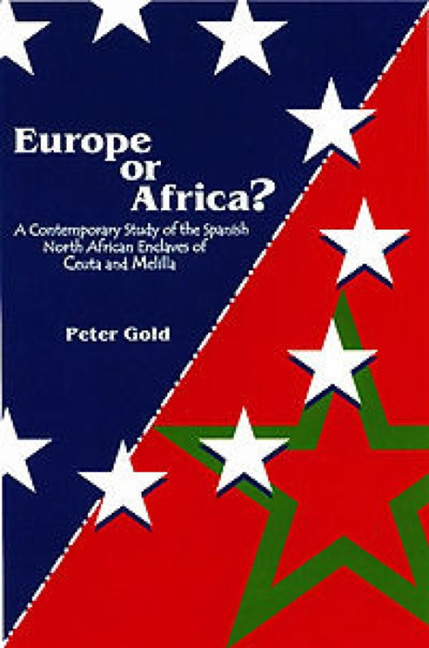Book contents
- Frontmatter
- Dedication
- Contents
- Acknowledgement
- List of figures and tables
- Map
- Introduction
- 1 The impact of the enclaves on Spanish–Moroccan relations
- 2 The enclaves within the Spanish state: the autonomy statutes
- 3 The evolving political landscape in the enclaves
- 4 The 1985 Immigration Law and community relations in the enclaves
- 5 The enclaves: a migration gateway to Europe
- 6 The enclaves: Europe or Africa?
- 7 Gibraltar and the enclaves
- 8 Conclusion: looking to the future
- References
- Index
3 - The evolving political landscape in the enclaves
- Frontmatter
- Dedication
- Contents
- Acknowledgement
- List of figures and tables
- Map
- Introduction
- 1 The impact of the enclaves on Spanish–Moroccan relations
- 2 The enclaves within the Spanish state: the autonomy statutes
- 3 The evolving political landscape in the enclaves
- 4 The 1985 Immigration Law and community relations in the enclaves
- 5 The enclaves: a migration gateway to Europe
- 6 The enclaves: Europe or Africa?
- 7 Gibraltar and the enclaves
- 8 Conclusion: looking to the future
- References
- Index
Summary
When two leaders of locally based parties in Ceuta and Melilla, Vicente Bonache and José González Orell, visited Gibraltar in July 1985 and had talks with the Chief Minister, Sir Joshua Hassan, and the leader of the opposition, Joe Bossano, they were struck both by the considerable degree of autonomy enjoyed by the British colony and also by the strong sense of Gibraltarian identity, the equivalent of which, they admitted, was lacking in their own territories. They found that the vast majority of Gibraltarians felt themselves to be Gibraltarian first and British second, whereas the residents of the two North African enclaves considered themselves to be Spaniards first and ceutís or melillenses second. This was no doubt a reflection of a growing preoccupation in the enclaves with maintaining Hispanic hegemony in the face of an increasingly assertive non-Spanish community (see Chapter 4), and it is possible that Gibraltarians would have felt differently if an increasing number of Spaniards had become a significant part of the population of the Rock. But it is equally possible that sixteen years of blockade by Spain (1969–85) had forged a much stronger collective identity within the population of Gibraltar than was the case in the North African enclaves.
Elections: 1977–94
This identification with Spain translated itself in political terms within the enclaves into the predominance of support for mainstream parties in national elections held in the years since the transition to democracy (for the performance of the two main parties in the enclaves in national elections, see Table 3.1). In the Constituent Assembly elections in 1977, the main support in both enclaves went to the UCD, the centre-right coalition created to provide an acceptable vehicle for the transition, although in Ceuta the PSOE was less than 4 per cent behind the UCD (Figure 3.1), compared to 29.2 per cent behind in Melilla (Figure 3.2). After some vigorous debate in the new national Parliament the 1978 Constitution was generous to the enclaves, granting to each of them one representative (diputado) in the Lower House and two senators for the Upper House of the national Parliament.
- Type
- Chapter
- Information
- Europe or Africa?A Contemporary Study of the Spanish North African Enclaves of Ceuta and Melilla, pp. 56 - 90Publisher: Liverpool University PressPrint publication year: 2000



